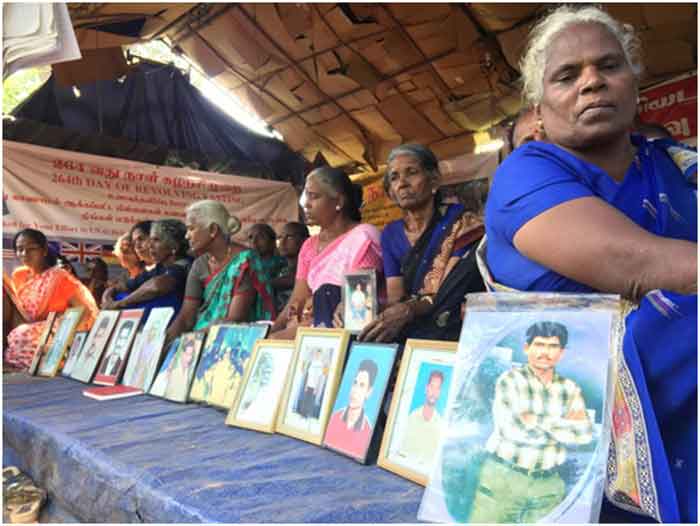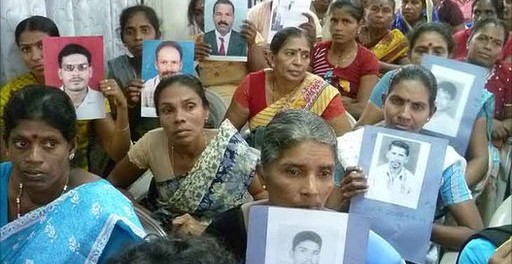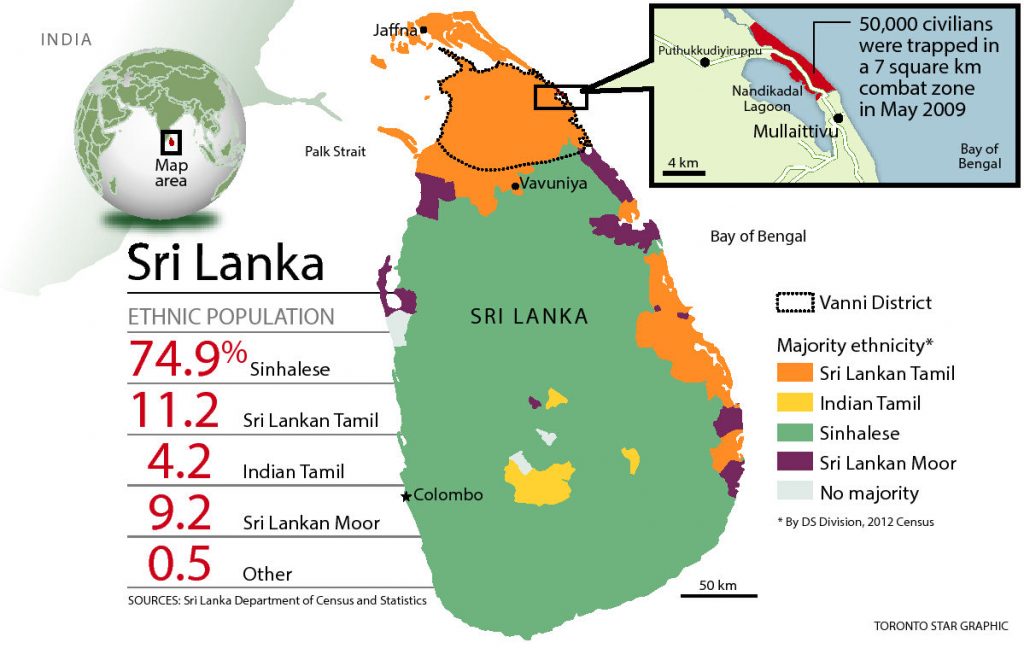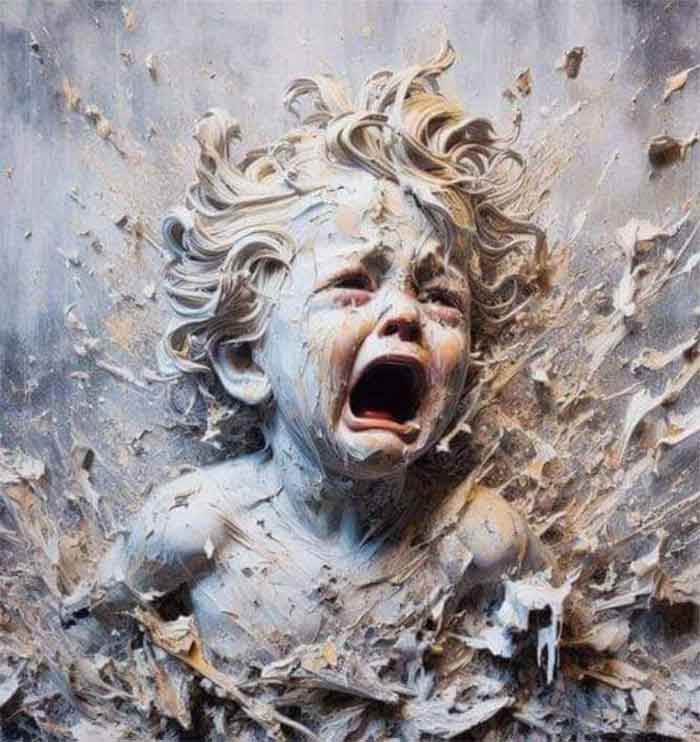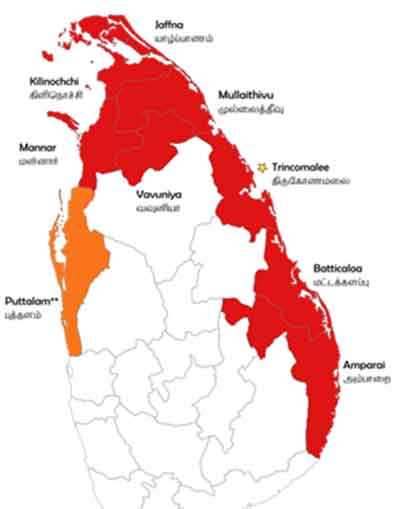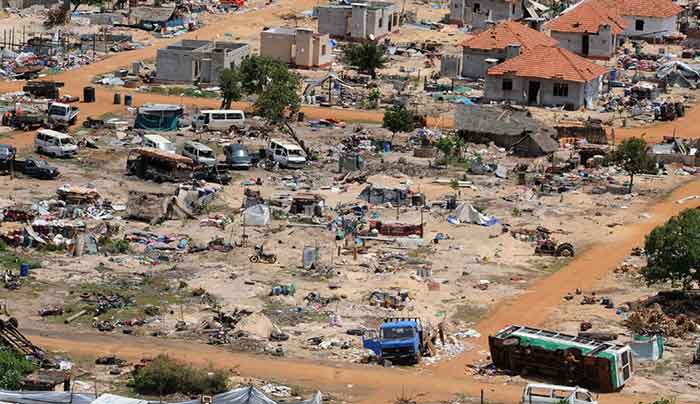
In the March 2022 UNHRC Sessions Human Rights Commissioner Her Excellency Michael Bachelet is expected to present her oral Report on progress made by Sri Lanka in respect of various UNHRC Resolutions passed since 2015
This Session is particularly crucial for the victimized Tamils who have pinned their hopes only on UNHRC and the United Nations to deliver justice and remedy their political grievances which were set in motion by Sri Lanka’s successive Governments since 1956.
Since the passing of the Resolution in October 2015, UNHRC Officials and Rapporteurs have been making several visits to Sri Lanka to monitor the progress and assess the ground situation in Sri Lanka. Most of their published Reports revealed a lack of progress, delaying tactics and sugar-coated promises of compliance.
The sum result is nothing but disappointment while Sri Lanka is also defying the United Nations and UNHRC by challenging their rights to interfere with the internal affairs of Sri Lanka including its integrity and sovereignty. This approach and defiance is nothing but a slap on the International Organization’s Stature, and functioning after accepting and becoming a member of the United Nations and UNHRC when it is bound to comply with their written obligations.
UNHRC Resolution of 30-01-2015 was aimed at promoting Reconciliation, Accountability and Human Rights in Sri Lanka. The Resolution welcomed certain steps of Sri Lanka and recommended other steps towards achieving the goals of reconciliation, accountability and justice including human rights. Among others, the Resolution welcomed Sri Lanka’s commitments to the devolution of political authority. When reviewing the progress in this matter, there is no iota of doubt that steps towards devolution remain frozen. The powers already granted to the Provincial Councils, particularly over land and police remain blocked by the Central Government. In this situation, expecting the centre to devolve more powers is nothing but only a fiction.
Even the hope of reconciliation through a new constitution as hoped by the Tamils has evaporated viewing the ongoing battles for power waged by the major political parties against each other. As long as the agenda of Buddhisisation and Sinhalisisation [Making Sri Lanka a Buddhist/Sinhala country – with no political rights for minorities Tamils, Muslims and Christians] continues which is sown and fed by Buddhist Clergy, communalists and extreme Buddhist Sinhalese coupled with majority hegemony, a permanent and just political settlement appears to be a distant dream.
About accountability, the less said the better and the answer is simple and easy, not an inch of progress has been made to bring those who are accused of war crimes, crimes against humanity to courts with neither prosecution nor the set up of an Internal Judicial Mechanism as undertaken and promised by the Sri Lankan Government to the International Community.
In the face of the defying statements of the President and the Prime Minister who have vowed to shield and protect the Security Forces from prosecution and appearing in courts, it would be futile to expect the fulfillment of accountability commitment by Sri Lanka which is a strict follower of the culture of impunity to Armed Forces since 1958. Even few prosecutions initiated against some members of the Security Forces have been dragging on for many years to the dismay and frustration of the traumatized victims, mostly Tamils and very recently even the jailed war criminals have been pardoned and released.
With accountability being disowned and discarded by Sri Lankan state machinery, the victims seeking justice are left with no other alternative than to seek the intervention and assistance of United Nations, UNHRC and the International Community. It is hoped that the World Bodies will rise up to the occasion and buttress their credibility and commitments to uphold human rights of all citizens of all member countries.
Regarding UNHRC’s Recommendations to ensure “Full enjoyment of human rights by all members of Sri Lankas’ population” it can be stated that full enjoyment for Tamils has been stripped and curtailed since the passing of the draconian Prevention of Terrorism Act [PTA] of 1979. The heavy presence of Army Personnel in the North and East where most of the Divisions of the Army are stationed is diluting the basic human rights of movement of people and their rights to live and earn their livelihood in their own historical and traditional lands. The Security forces [95% Buddhist/Sinhalese] are mostly engaged in surveillance of the civilians and instilling fear and insecurity even after the end of the war almost 10 years ago. Besides, the military is engaged in civilian activities like running farms in civilian lands, running Hotels, shops and even Primary Schools to Tamil children.
To summarise, Sri Lanka has comprehensively failed to implement the following UNHRC Recommendations:-
[i] “Expediting the process of delivery of durable solutions for all internally displaced persons.”
According to I – Trans Report [International Tamil Refugee Assistance Network] published in October 2018, 90,000 families in Northern Province are homeless and living in shanties and slums” This process is haphazardly carried out without any firm road map or agenda.
[ii] Torture is still practiced and going on as per the UN Rapporteurs and media and very recently International Truth and Justice Project Madam Jasmin Sooka has confirmed the persistent practice of torture after she interviewed some victims of torture.
References:-
Dozens of men describe rape, torture by Sri Lanka government
https://nypost.com/2017/11/08/dozens-of-men-describe-rape-torture-by-sri-lanka-government/
Torture of Tamil detainees in Sri Lanka has continued, says charity https://www.theguardian.com/world/2015/aug/13/torture-tamil-detainees-sri-lanka-report-alleges
[iii] An independent oversight of the security system has not yet been set up. It is doubtful it will ever be carried out due to the present structure and inbuilt system.
[iv] Independent, impartial and transparent judicial mechanism manned by impartial professionals has still not been set up to redress past abuses and violations to ensure credible accountability processes including initiation of prosecutions. Viewing the state’s policy and culture of impunity, this recommendation will probably face a slow death.
[v] Has failed to honor its commitment to grant extensive devolution of powers to the Northern and Eastern Provinces.
[vi] Has failed to implement its own Lessons Learnt and Reconciliation Commission [LLRC] recommendations.
[vii] Sri Lanka’s proposal to establish a judicial mechanism with a Special Counsel to investigate all allegations of violations, and abuses of human rights and violations of International Humanitarian Law, remains almost dead.
[viii] Recommendation to reform Sri Lanka’s domestic law is yet to be initiated, including “Introduction of effective Security Sector Reforms as part of International Justice Process.” So far there is neither any indication nor any steps taken to look in to these matters.
[ix] Recommendation to accelerate the return of lands to its rightful civilian owners remains unfulfilled. It is learnt that more than 4000 acres of land in the Northern Province and more than 3000 acres of lands in the Eastern Province remain in the hands of Security Forces, although there were occasional releases of few acres of land with much publicity and fanfare. The recommended “Ending of Military involvement in civilian activities” is yet to begin and no firm instructions have still been issued to this effect.
[x] Recommended repeal of Prevention of Terrorism Act [PTA] is yet to materialize which is generously and exclusively applied to Tamil youths. A new Act amending the provisions of 1979 Act is under consideration in the Parliament which does not repeal the core provisions of the PTA 1979 Act.
[xi] Recommendations to ensure that all Provincial Councils are able to operate effectively in accordance with the 13th Amendment to the constitution has been treated contemptuously by the Centre despite the Provincial Councils’ repeated requests to implement the provisions such as granting Police and Land powers to the Provinces.
[xii] Recommendation to Government to prohibit acts of torture, rape and sexual violence by Security Forces is yet to be fully complied with as Reports of Torture and Sexual violence have been exposed by UN Officials, with hardly any investigation and punishment being meted out to the perpetrators.
However, the Sri Lankan Government has passed the Office of Missing Persons Act and an Act dealing with Enforced Disappearances. Sad to say the proposed Acts, with many flaws, are still not operational with no firm commitment by the Government to deal with the approximate 65,000 or more persons said to have disappeared during the final stages of war. Most of the disappeared are those who surrendered to the Military during the war and those arbitrarily arrested by the Military/Police during and after the war. The Government has also refused to provide details and statistics as to the identities of disappeared, surrendered, detained or killed.
In summary, it is abundantly clear that the Sri Lankan Government has deliberately and stubbornly discarded the core recommendations of the UNHRC and has made a mockery of Justice, Accountability and Reconciliation as promoted and safe-guarded by the UNHRC, United Nations and UN Security Council.
There is no doubt that Sri Lanka will continue its policy of holding out promises and delaying tactics to weaken the Resolution of UNHRC and United Nations hoping for ultimate slow death of the Resolutions.
There is no gainsaying of the fact that Sri Lankan Tamils can be considered the worst sufferers of human rights in the world since 1958 and the International Community, UNHRC and United Nations simply ignored and miserably failed to stop the hidden agenda of Genocide set in motion from 1948 against the minority communities to make Sri Lanka a Buddhist/Sinhala State which reached its climax in 2009 and still continues at rapid speed.
It is of the utmost urgency and importance that UNHRC, United Nations and UN Security Council initiate appropriate steps to ensure justice and allow the Tamils to choose their own destiny through a Referendum in the Northern and Eastern Provinces [Traditional and historical homeland of the Tamils for centuries] in accordance with UN Conventions under UN supervision.
To ensure and uphold accountability, a reference to the International Criminal Court and setting up of an UN sponsored international investigation must be given priority for consideration by the UNHRC, United Nations and Security Council.
The recent “ONE COUNTRY ONE LAW’ Presidential Task Force campaign launched by its Chairman Galagodaaththe Gnanasara Thera with the blessings of Government is another chauvinistic step which is accelerating the process of marginalization of Tamils and Muslims striking at their religious and cultural rights including traditions.
The victimized Tamils still pin their hopes on the UNHRC, United Nations and UN Security Council to guarantee their dignified existence in their traditional and historical homeland in Sri Lanka.
Thambu Kanagsabai, LLM. London, Former Lecturer in Law, University of Colombo, Sri Lanka

